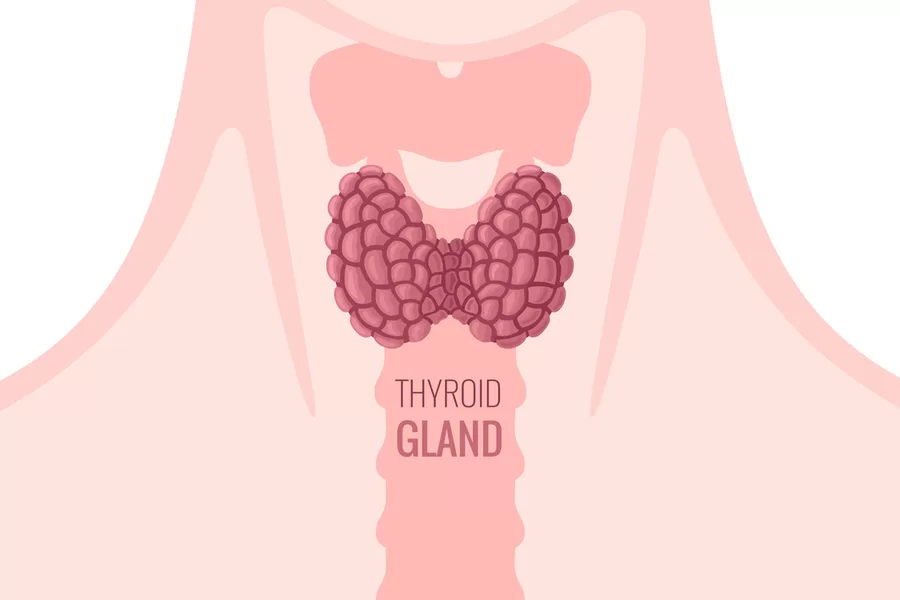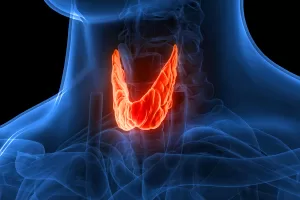Different glands that represent an important part of our bodies release hormones to control certain physiological processes. It is a sophisticated mechanism, in which each participant plays its role. In addition, the proper concentration of hormones is no less important than their nature. Let’s unveil the functions and importance of the thyroid gland for our health and find out what it produces and how these compounds influence our lives.
Anatomy of the Thyroid
This small gland is located in the neck, wrapping up the trachea. It consists of two parts that are connected in the middle and therefore it is often associated with a butterfly. The normal size of it is quite small. That is why we do not see or feel it when it is healthy and performs its functions properly.
Follicular cells
These cells contain the required ingredients for the synthesis of the thyroid hormones. They are released from them in the presence of thyroid stimulating hormone and go to the bloodstream and then all over the body.
Parafollicular cells
The amount of this type of cell is lesser than the previous one. They are scattered across the gland and produce calcitonin. The latter is one more hormone of a different nature synthesized by this gland.
Blood supply
There is a set of arteries and veins surrounding the gland that supply the blood rich in oxygen and take away that with carbon dioxide.
Thyroid size
A healthy gland is nearly 2 inches long and can weigh up to 25 g in adults. It must not be visible when you look at your neck.
Hormones Produced by the Thyroid
There is a set of crucial substances that are produced here. They influence the whole metabolism and condition of the body including mood and appearance.
Triiodothyronine (T3)
This option is the main one. It is released in the blood to control the rate of the metabolic process, the functioning of the cardiovascular and reproductive system and many other processes. It is named due to the presence of three iodine atoms in its structure.
Thyroxine (T4)
This molecule contains four iodine atoms and serves as a predecessor to the T3 hormone. It is produced in larger quantities and then released into the bloodstream where it is converted into T3.
Calcitonin
The gland produces one more hormone that deals only with the metabolism of calcium. However, it also plays an important role in the body, especially for bones and muscles.
Iodine in production
For the synthesis of T3 and T4, the gland requires atoms of iodine. Usually, it gets them from water or iodinated salt. The gland stores iodine in its cells and utilizes it in the process of synthesis of these hormones after stimulation from the brain.
Conversion of T4 to T3
The gland produces more T4 than T3. Still, the T4 is converted into an active form when it comes to the blood.
Functions of the Thyroid Hormones
Now, let’s see more clearly what functions do these hormones perform and what processes in the body they regulate.
Metabolism
Metabolic processes include the mechanisms through which we gain energy from food and then spend it on our inner purposes. The body controls them mainly through the thyroid hormones. Thus, they influence the digestion and formation of energy and then follow up the process of its distribution.
Usually, the body tries to maintain balance and spend as much as it gets. If the intake of calories is lower than our needs, we lose weight, and vice versa. However, this inner hormonal control is crucial to command the cells to spend the energy or store it. That is why the misbalance, first of all, leads to abrupt changes in body weight.
Body temperature regulation
Body temperature is directly related to the intensity of the metabolic processes. Part of the obtained energy is always spent to maintain a constant temperature, no matter what outer conditions we face. As the weather outside is changing every day, the body needs to adjust to it. Again, the thyroid hormones play a key role in the success of this process.
Therefore, their misbalance is often experienced as intolerance to cold or hot temperatures. Without their guidance, the body cannot decide what to do and where to put energy, and as a result, a person suffers from heat or cold.
Heart rate regulation
As for the cardiovascular system, it experiences the influence of the thyroid in the following ways:
- regulation of the amount of blood the heart pumps;
- heart rate;
- strength of the contraction.
All these parameters are disturbed in the case of misbalance. First of all, the patients experience fast heartbeat without any obvious reasons. As the disease gets worse, there can be strokes and other serious consequences.
Growth and development
For proper development, the body needs energy. When there are problems with its supply due to the misbalance of thyroid hormones, all systems and organs suffer. If such a condition happens to a child, it can lead to severe consequences including damage to brain functioning.
As for the adults, they often experience unpleasant sensations in muscles, dry hair and skin issues. All these symptoms are often taken as minor and not worse consideration. However, it is not true and they should be treated in time.
Brain development
In children, thyroid hormones shape and directly influence the development of the brain and its proper functioning. This includes such processes as neurogenesis, differentiation of nervous cells, etc. If they are disturbed, this leads to severe problems with mental development.
As for adults, these compounds are also important to maintain the proper mood and live without a persistent feeling of anxiety and depression. Again, these symptoms are not always associated with thyroid issues. That is why it is worth keeping this information in mind.
Regulation of Thyroid Function
This small gland does not work on its own. Its activity is regulated by the brain and its special structures that rule over all the glands that are present in our bodies.
Role of the hypothalamus (TRH)
Hypothalamus is responsible for producing a thyroid-releasing hormone (TRH). The latter is required for stimulating the pituitary gland. Actually, this tiny gland in the brain rules over all hormonal system and takes care of the quality and quantity of the produced hormones.
Role of the pituitary gland (TSH)
When this gland receives the signal from the hypothalamus, it starts to release thyroid-stimulating hormone (TSH). It influences the follicular cells to produce T4 and T3. However, this process will be possible only if the concentration of iodine in the body is normal.
Common Disorders of the Thyroid
There are many factors that can influence this gland and its work. Moreover, millions of people all over the world are affected by the following diseases. Therefore, we need to stay aware of their symptoms and provide their prevention.
Hypothyroidism
This condition occurs because of iodine deficiency, inflammation processes or surgery in the gland, pituitary gland disorders, or due to radiation treatment. It can also be inborn or develop after the intake of certain medicines.
The common symptoms are as follows:
- persistent fatigue;
- excess weight;
- heavy and frequent periods;
- problems with hair and skin;
- a hoarse voice;
- bad memory;
- sensitivity to cold.
Without proper treatment, the gland becomes larger. Furthermore, heart diseases can occur, such as fast heartbeat and strokes. Women face fertility issues, as well as unpleasant changes in appearance and mood.
Hyperthyroidism
Another case is the overproduction of hormones. Still, hyperthyroidism is also a quite dangerous condition with many possible risks and complications. The common reasons for its development include excess iodine in the diet, Graves’ disease, nodules, inflammation or cancer. Sometimes misuse of thyroid hormone medicines also causes such a side effect.
Patients observe the following symptoms:
- the gland is enlarged and visible on the neck;
- vision becomes bad;
- the weight is abruptly decreased;
- persistent feeling of anxiety;
- sleep problems;
- weakness in muscles;
- irregular periods;
- sensitivity to heat.
Under such circumstances, the body is not able to control the flow of energy and metabolism. This leads to cardiovascular diseases, problems with digestion and the nervous system. Women often experience infertility.
Goiter
When the growth of the glands’ tissue is noncancerous, it is called goiter. This condition can occur due to a lack of iodine in the diet. Some regions are prone to this disease, so their inhabitants should consume salt enriched with iodine.
In addition, continuous inflammation or tumor that affect the gland cause its enlargement. The following signs are considered as reasons for diagnostics:
- a swelled neck;
- tightness in the throat;
- difficulties with breathing;
- cough;
- hoarse voice.
When there is too much tissue in the gland inside the neck, it makes it tight and disturbs normal breathing and swallowing. In addition, the synthesis of hormones also changes and hormonal misbalance can occur.
Thyroid nodules and thyroid cancer
Unfortunately, this gland is prone to the formation of nodules and cancerous processes. This may happen because of hereditary risks and gene mutations. Moreover, if there are some other issues related to the gland that were left untreated, this may result in a tumor in a few years.
Obvious symptoms are quite similar to goiter, so a biopsy will be needed to prove the condition. Usually, patients experience:
- swollen neck;
- a feeling of tightening;
- breathing and swallowing problems;
- hoarse voice.
Additional symptoms of hormonal misbalance occur lately. They include weight changes and mood swings. Moreover, the cancer may spread and metastasis may follow if the disease was not diagnosed and treated properly.
Summary
In a nutshell, this relatively small gland is more than important for living a healthy and happy life. It produces substances that participate in numerous inner processes and their quantity must strictly correspond to the norm.
It is easier to prevent problems with the thyroid gland. Therefore, stay attentive to your diet and the amount of iodine in it, and make a regular check up of these hormones at least once per year. This is enough to discover the problems at an early stage and to start adequate treatment and save health.
FAQ
What is the main function of thyroid?
It releases the set of hormones that control the consumption of energy by the body, and the work of such main systems as cardiovascular, nervous, digestive and reproductive.
What are the four functions of thyroid hormone?
These compounds control the normal performance of the organs of cardiovascular, nervous, digestive and reproductive systems.
What will happen if your thyroid is not functioning?
In this case, the body cannot consume the energy properly, an overall metabolism is disturbed and the general condition becomes bad.
What are early warning signs of thyroid problems?
If you experience sudden weight changes, mood swings, constant fatigue and sleep disorder, it is better to check the blood levels of thyroid hormones.




